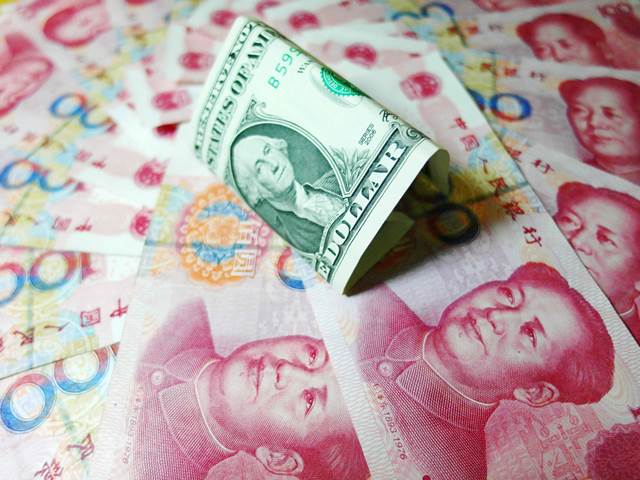On the 30th of November 2015, the IMF officially declared that China’s national currency, the Yuan would join the Dollar, Pound, Euro and the Japanese Yen in the IMF’s basket of reserve currencies, stating that China had “met all existing criteria.”[1] This move would mean that by October 2016, the month when the decision becomes active, the Chinese Yuan can be freely exchanged with the IMF’s Special Drawing Rights (SDR) which are used as international currency that countries can utilise to resolve balance of payments issues. The reserve currencies thus become the only medium of exchange to which access to the SDR can be provided, thus giving those currencies significant economic clout.
Prior to becoming the most popular reserve currency in the world, the US dollar had to unhinge the UK’s Pound sterling from the spot. An opportunity emerged when Europe entered World War I, the war which laid the foundation for the destruction of the Ottoman Caliphate and the division of the Middle East according to the Sykes-Picot Agreement of 1916. European currencies, prior to the war were pegged against gold, but during the course of the war many European nations abandoned the gold standard and chose to print money in order to fund the war effort. The UK went from being a money lender to becoming a borrower,[2] leading to the US becoming the global lender. It was already the world’s largest economy from 1878.
During the course of World War II, the US again, lent large sums of money to Europe in exchange for gold, accumulating most of the world’s gold reserves by the end of the war, storing them in the well-publicised, Fort Knox. With the US controlling the majority of the world’s gold reserves, it became meaningless for nations to revert back to the gold standard and following the Bretton-Wood Agreements of 1944, the developed economies of the world agreed to peg their currencies against the US dollar, which in turn would be pegged against gold. Through this, the US dollar became the most powerful currency in the world and remains so today, despite no longer pegging the dollar against gold. Not only did the US solidify its global economic power after WW2, but it also demonstrated its political ambitions, with the detonation of nuclear warheads upon the cities of Hiroshima and Nagasaki also signalling the superior military muscle that it possessed.
But is this all about to change with the rise of China?
China’s leadership began opening up their economy to foreign investment in the 1980’s, allowing foreign and private ownership of assets whilst also selectively utilising state ownership.[3] The economic reforms carried out by Deng Xiaoping in the 1980’s propelled China from producing just 2.2% of the world global output in 1982, to 14.6% by 2012,[4] a meteoric rise almost rivalling that of the US before World War I. China has quickly become a manufacturing hub for cheap consumer goods, providing substantial capital through exports, whilst keeping 95% of the working population employed.[5] Its ability to quickly implement discussed policies, that would usually in a democratic system take years to pass, has contributed significantly to its rapid rise to prominence.
However, despite the positive economic growth figures and the impact of advantageous economic policies, China’s success has just been that, purely economic. During the course of this period it hasn’t been able to show the hunger that the US showed when it came to dethroning Britain as the global super power. Not only did the US go on to dominate the global economy, it also went on to dominate global politics, forcing Britain and France to cede their old colonies in the Middle East and South Asia. The presence of the US was and is still felt around the world, militarily, politically, scientifically and even culturally. All of this despite having launched two disastrously unsuccessful ground wars in the past decade and a half. China on the other hand, can barely project any influence outside its own region, has no culture to propagate and barely any meaningful scientific discoveries. Beijing is generally absent on the global political spectrum, and seems to be focused on continuing to propel its economic growth. The so called China-Pakistan Economic Corridor is evidence of the lack of political ambition shown by Beijing, highlighting their commitment to building a stronger economy rather than being able to project power globally, the purpose of this project is to connect China with a more viable, quicker and efficient route via the Arabian Sea to the vast markets of the Middle East.
Despite tangible evidence that the US as a global superpower is in decline, with forecasts that China will overtake the US to become the world’s largest economy, in nominal terms, by 2026.[6] The US became the world’s largest economy by 1878, but it was not until WW2 that it managed to dethrone Britain to become the global superpower, 63 years after it had become the world’s largest economy, but even then, this was only possible due to the nature of the policies the US implemented, which were ideological in nature, aggressive and preyed on the vulnerability of the post-war European nations. Contrast this to China and you have passive policies geared towards strengthening the economy alone and a passive nation will not lead the world today, nor in the future.
Tanish Choudhry
[1] http://www.bbc.co.uk/news/business-34957580
[2] http://qz.com/294809/why-the-us-has-the-most-powerful-currency-on-the-planet/
[3] http://www.fsmitha.com/h2/ch37-econ6.htm
[4] http://foreignpolicy.com/2014/05/16/is-china-the-fastest-rising-power-in-history
[5] http://www.tradingeconomics.com/china/unemployment-rate
[6] http://uk.businessinsider.com/chinas-gdp-is-expected-to-surpass-the-us-in-11-years-2015-6?r=US&IR=T

